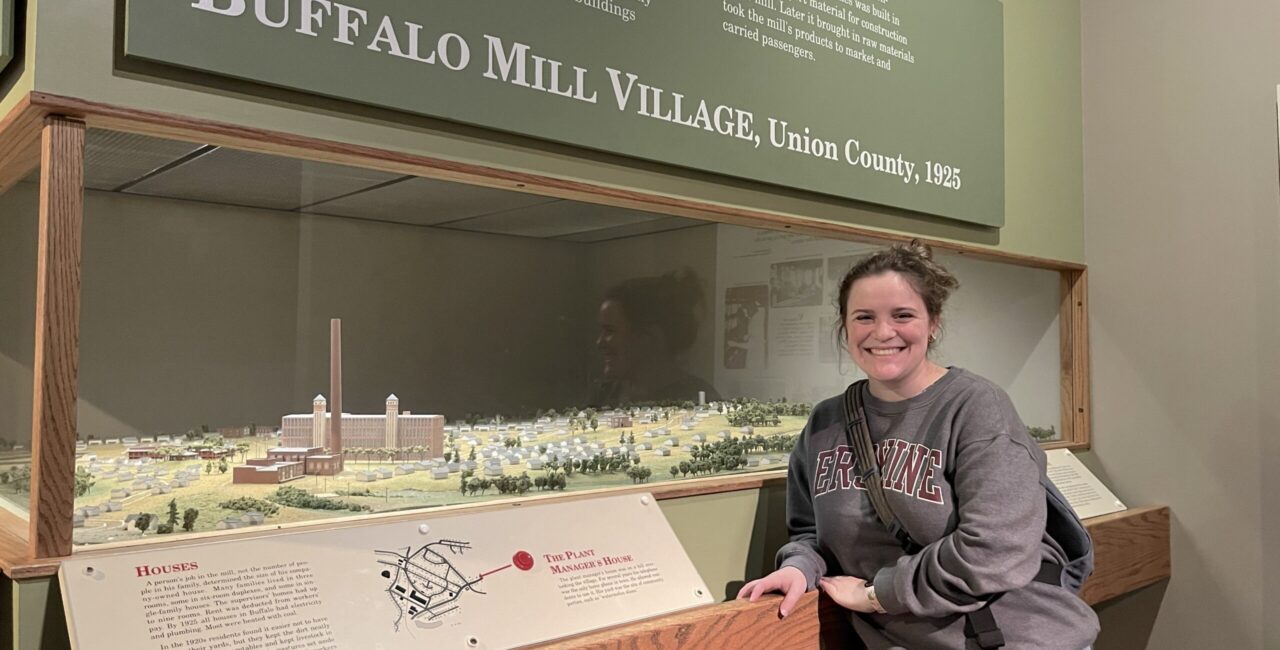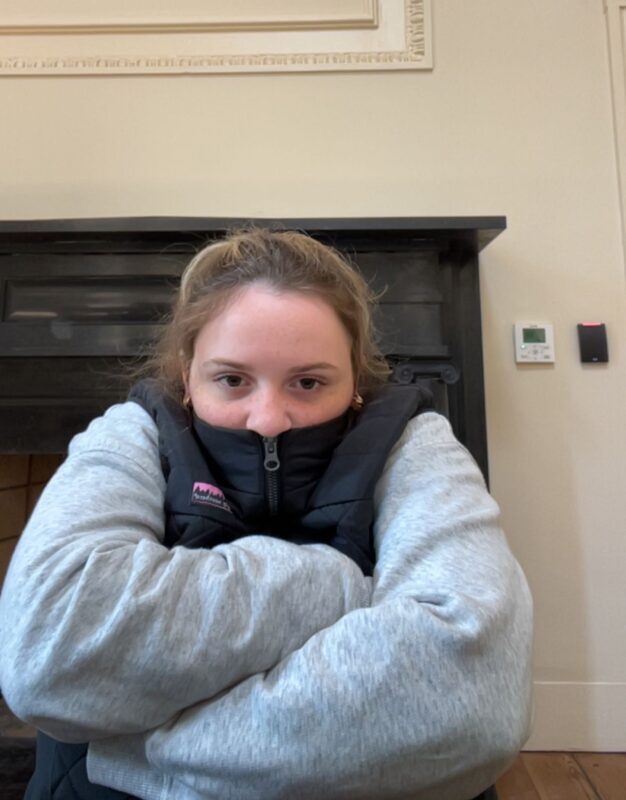
Stories worth preserving: triple major’s SCICU grant sets her on a new path
Erskine College senior Sharon George, a Presidential Scholar pursuing a triple major in history, psychology, and Bible and religion, was awarded a research grant for her project “Holy Textiles: The Relationship between the Methodist Episcopal Church, South (MECS) and Upstate South Carolina Textile Mills.”
Opportunity beckons
Sharon applied for the grant through the South Carolina Independent Colleges and Universities (SCICU) Undergraduate Student/Faculty Research Program. She is working on the project with McDonald-Boswell Associate Professor of History Dr. John Harris.
“The SCICU program looks for the best undergraduate researchers in the state,” Harris says. “Sharon is one of Erskine’s very best and so I encouraged her to apply.”
Sharon learned about the program from Harris and Assistant Professor of History Dr. Christiane-Marie Abu Sarah. She had already completed her required senior thesis and would not receive course credit for her SCICU project. “A stipulation of the grant is that you cannot receive course credit for the work that’s completed in the funding period.”
Seizing her chance, Sharon worked with Harris to get the application together during spring break last year.
Once the proposal was submitted, “It was evaluated by a team of faculty members from SCICU member institutions representing various discipline areas and selected for funding,” says SCICU Director of Finance and Administration Brenda Torrence.
Mill villages, village churches
Harris, who serves as supervising professor for the research, was impressed with Sharon’s idea for the project, which she summarizes as “looking at the way the South Carolina Methodist Episcopal Church, South interacted with textile mills and the surrounding mill villages in the upstate of South Carolina in the early 1900s.”
Sharon drew on knowledge gained in at least two of her three majors. “The project combines Sharon’s strengths as a history major and a Bible and religion major,” Harris says. “And getting paid to do historical research—what could be better?”
About 40 percent of the research materials Sharon has used are available in digital format, but she has traveled to look at the rest.

Her most intense research experience for the project so far, she says, was also the most eventful. Two days before she planned to go to the University of South Carolina to examine archives in the South Caroliniana Library, her car broke down.
However, with a little family assistance, she managed to spend nearly a week looking at microfilm versions of the Southern Christian Advocate, the newspaper of the South Carolina Methodist Episcopal Church, South. Her trip was productive despite logistical problems. She had consulted with Harris in advance on making the most of her time in Columbia as well as ensuring that she “understood what I was looking at,” she says.
A little closer to her campus home in Due West was Sharon’s work at the Anderson County Museum and the Anderson County Library, where she learned about mills and churches in the area. Anderson County includes the city of Honea Path—where the Chiquola Mill Massacre took place—and Pelzer, also a mill town. She has done additional research at the library in her hometown of Spartanburg, a city where, she says, “the remains of the textile industry are very visible.”
Learning the truth, charting a path
Sharon isn’t always comfortable with what she learns as she conducts her research. “I’ve uncovered some parts of this history that aren’t nearly as happy as I would like, and that’s to be expected,” she says, citing the silence of some Christians in the aftermath of the Chiquola Mill Massacre, an armed dispersal of a strike in 1934 in which seven workers were killed.
While her investigations have sometimes revealed regrettable aspects of history, Sharon’s work has inspired her. “The whole research experience has actually opened up a new career path for me,” she says.
“I really love working in the archives, and being an archivist would give me the opportunity to do that while still being able to educate people about history. Thank you, Dr. Harris, for mentioning that as a career path!”
She plans to pursue a master’s degree in library science with an emphasis in archival studies. “Eventually, I want to get my Ph.D. in history, but that’s just not where I am in my life right now. You’ll be seeing me around, though, because I plan on staying in the area after graduation!”
For Sharon, the significance of history is undeniable. “I really want to preserve the past and keep it accessible for future historians,” she says. “These are the stories of people and their lives, and I don’t think we should underestimate the importance of preserving them.”
Sharon George, pictured at top next to a diorama of the Buffalo Mill Village at the South Carolina State Museum, is slated to present her research Feb. 22, 2024, at the SCICU Research Program Symposium.
